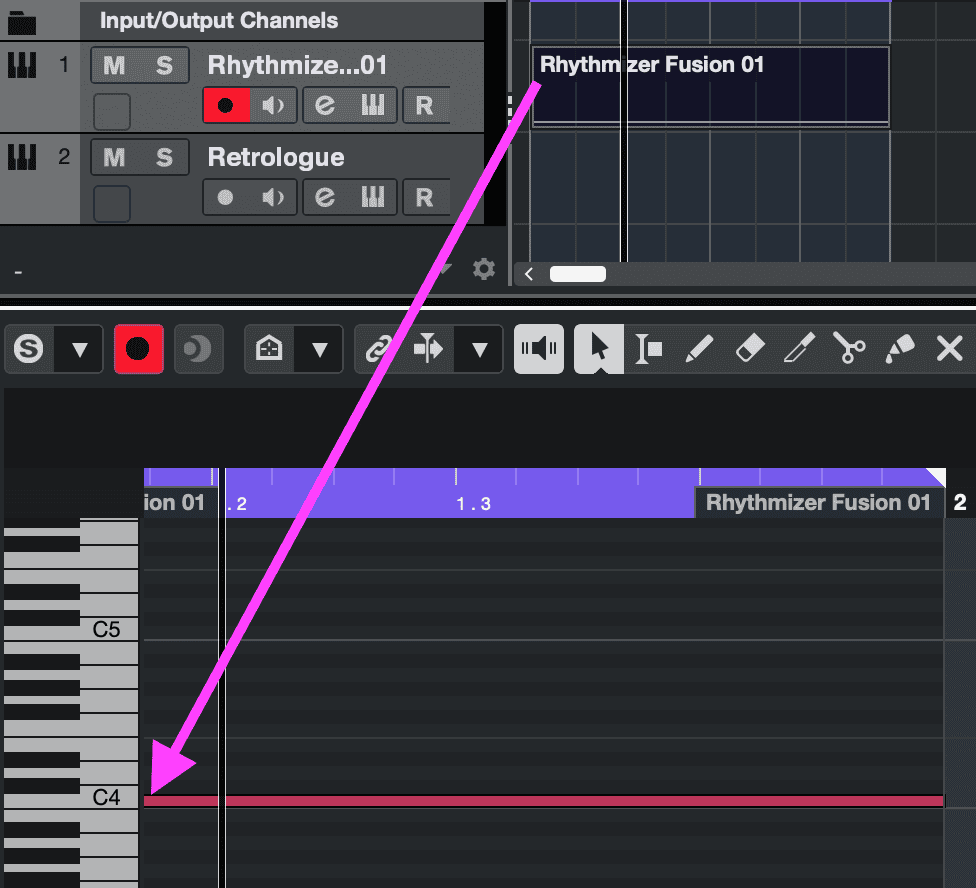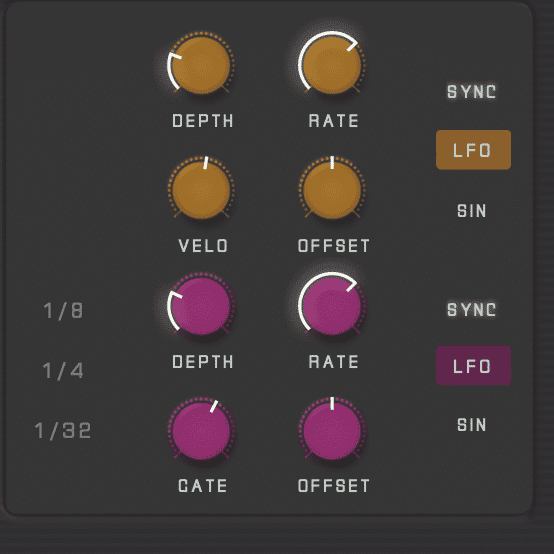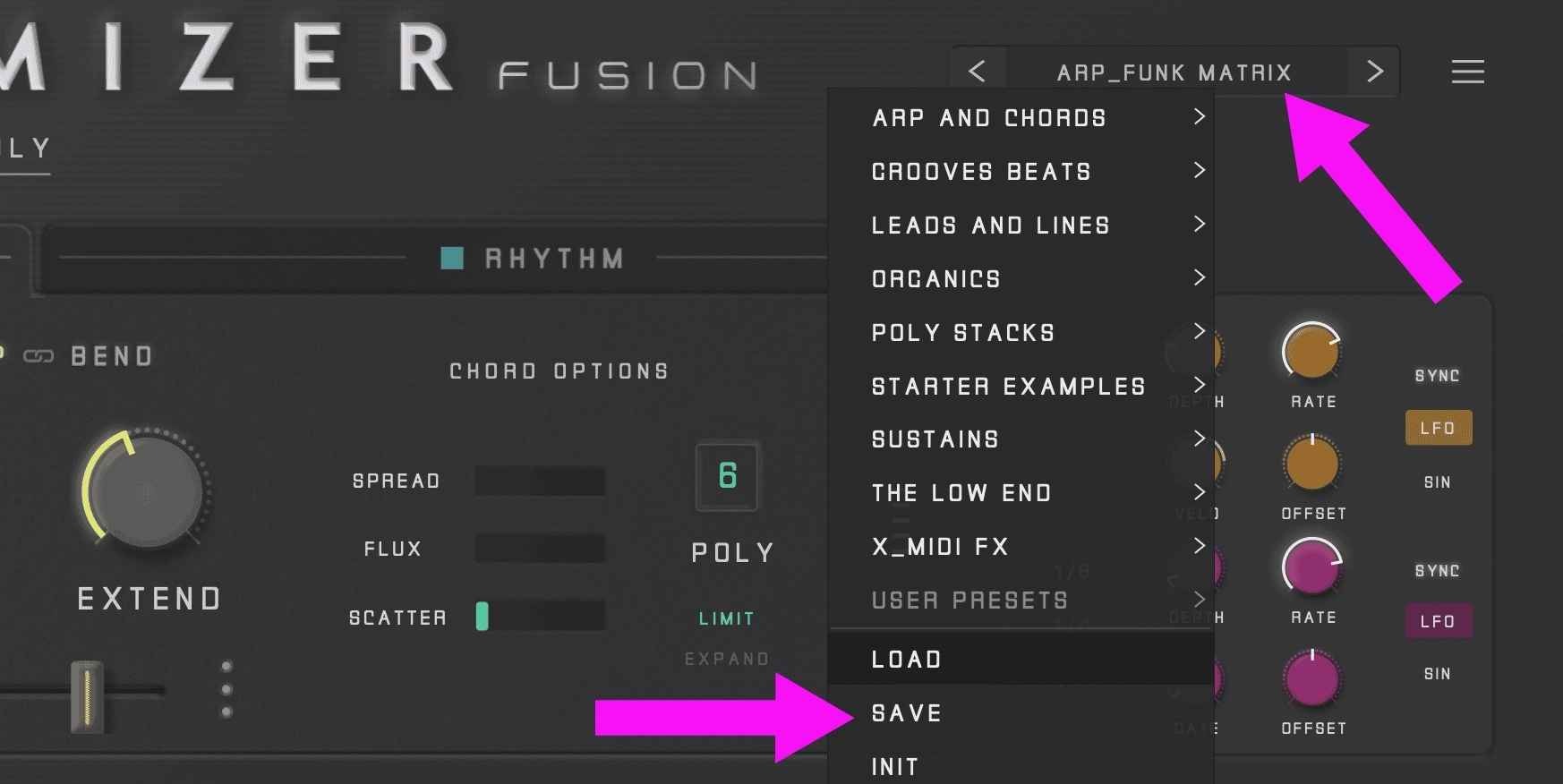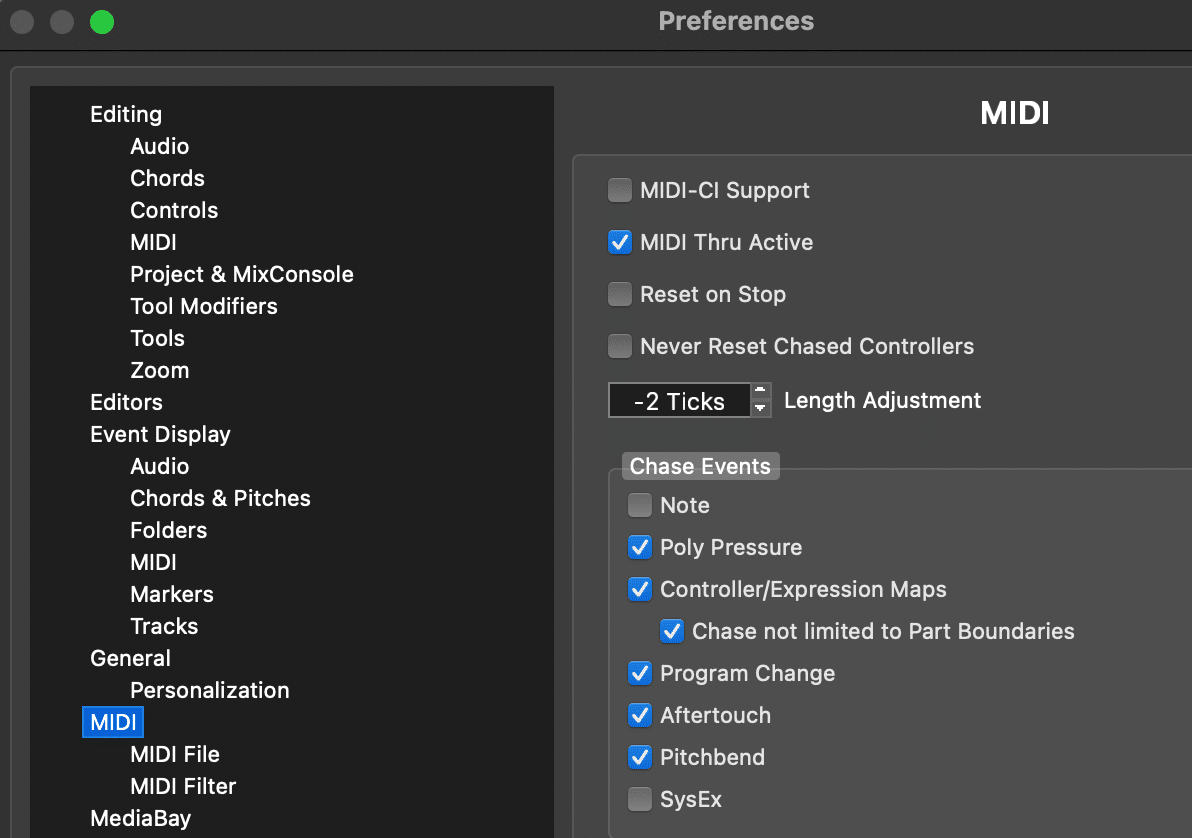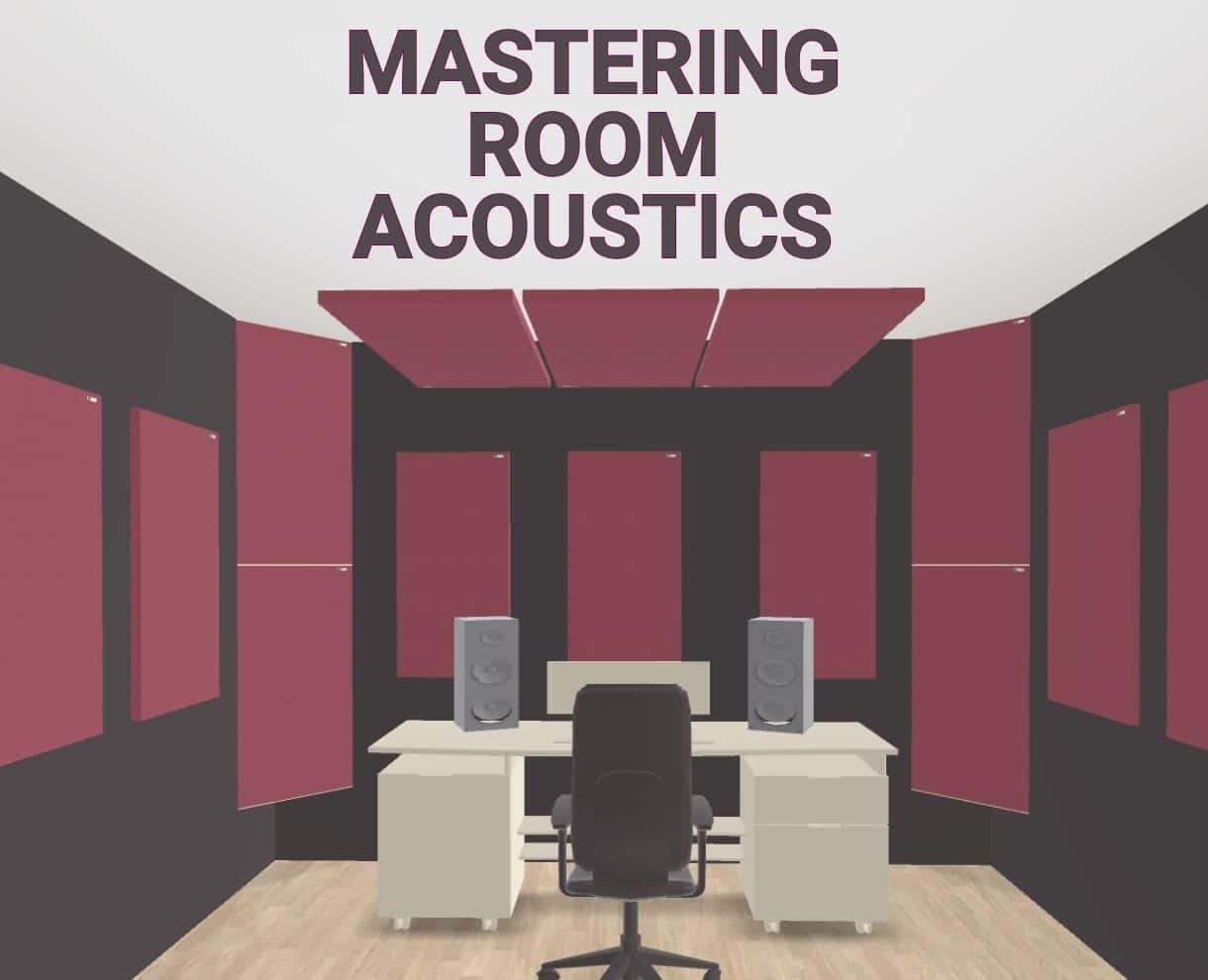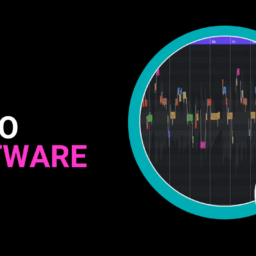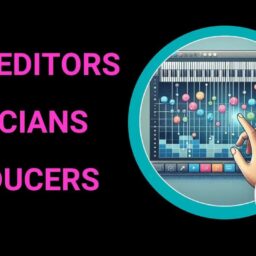Disclosure: I’m not affiliated with Futurephonic Rhythmizer nor with the company in any way. I just love the plugin and I believe it deserves a little bit of attention so… here we go
What is Rhythmizer?
Futurephonic Rhythmizer is a powerful MIDI plugin designed to generate infinite randomized MIDI patterns, helping music producers compose unique and complex rhythmic sequences. So, if you’re stuck in a creative rut or looking to explore new musical territories, Rhythmizer can be your secret weapon. By tweaking scale and rhythm probabilities, you can free endless rhythmic patterns that breathe new life into your tracks.
One of the standout features of Rhythmizer is the Poly Stack mode, which allows you to generate harmony by stacking multiple notes to create rich, complex chords. This feature, combined with the ability to assign randomized MIDI CC messages and the advanced Bend Mode for LFO pitch bending, enables you to craft controllable yet unpredictable melodies that keep your listeners engaged. With Rhythmizer, the possibilities are endless, making it an essential tool for any serious MIDI enthusiast.
What is Rhythmizer Ultra
So, we already have a little idea of what Rhythmizer is. When used with your favorite synth, it can produce endless rhythms and melodies you never thought of. Rhythmizer is perfect for pushing boundaries and creating controlled chaos in your tracks.
Who Is This For?
Futurephonic Rhythmizer is for anyone who wants to be creative and innovative in their music production. Whether you’re an experienced producer or just starting out, this plugin unlocks endless possibilities. Here’s who will benefit the most:
👉 Producers
From electronic to orchestral, Rhythmizer is perfect for producers who want fresh ideas and layered rhythms. Poly Stack mode makes it easy to create lush harmonies, while advanced MIDI CC control lets you shape sounds that stand out in any mix. If you’ve been looking for a tool to take your artistry to the next level, your search ends here.
👉 MIDI Lovers
MIDI head? You’ll love this. Rhythmizer takes MIDI sequencing to the next level with randomization controls, CC magic, and creative tools like Bend Mode for pitch perfect flexibility. The plugin turns basic MIDI tracks into mesmerizing compositions, with complete control and endless inspiration.
👉 Producers Struggling With Ideas
Stuck on that next big idea? Say goodbye to blank session syndrome! Rhythmizer’s infinite randomized MIDI patterns will help you break free from creative blocks. It’s like having a co-producer who never runs out of ideas. Find new directions, experiment with scales and rhythms, and watch your tracks come to life.
👉 Live Performers
Performers, take note! Rhythmizer shines live, with responsive and evolving sequences that keep your performance fresh and engaging. With the MIDI Loop button, you can capture evolving patterns on the fly, perfect for live improv or creating grooves that keep the crowd moving.
👉 Producers Who Love To Experiment
If creating unique sounds is your thing, Rhythmizer is your dream plugin. Deep customization lets you shape every rhythm, note, and probability to your taste. Combine it with your favorite synth for weird textures or chain it with another Rhythmizer for uncharted sonic territory.
👉 Artists Who Want Efficiency
Don’t want to compromise creativity for CPU usage? Rhythmizer is optimized to run multiple instances without breaking a sweat, so it’s perfect for producers working on dense, multi-layered projects. Compose chords, basslines, or melodies.
Rhythmizer Features at a Glance
- MIDI Loop button to generate infinite randomized MIDI
- Poly Stack for complex chords and harmony, poly stacking for added depth
- Advanced LFO pitch and bend mode for an organic feel to your melodies
- Custom scales and randomized MIDI for endless possibilities
- High-level CC manipulation for serious MIDI CC geekery
- MIDI CC wizardry for advanced manipulation of synth parameters and enhanced creativity
Advanced Techniques for Music Producers
To truly unlock the potential of your Rhythmizer, here are some advanced techniques that can take your music production to the next level:
- Poly Stack Feature: Dive into the Poly Stack mode to create intricate chords and harmonies. Experiment with different scale modes and bend settings to discover unique sounds that add depth and complexity to your tracks.
- Bend Mode: Utilize the Bend Mode feature to achieve advanced LFO pitch bending. This allows for enhanced melodic flexibility and creative expression in your MIDI compositions, enabling you to manipulate pitch bends and create complex melodies.
- Random Step Slider: Use the Random Step slider to introduce subtle variations in your rhythmic patterns. This technique can add a human touch to your sequences, making them feel more organic and less mechanical.
- MIDI Loop Button: Capture short sequences of the Rhythmizer’s note randomization process using the MIDI Loop button. Loop these sequences for as long as you need, creating a foundation for endless grooves that keep evolving.
- High-Octane CC Manipulation: Take advantage of the advanced CC Mapping settings to control your synth parameters. This high-octane CC manipulation can lead to dynamic and expressive performances that stand out in any mix.
- Plugin Integration: Don’t hesitate to use the Rhythmizer alongside other plugins or instruments. This combination can result in unique textures and sounds that push the boundaries of your music production.
Try incorporating these techniques, make the most of your Rhythmizer, and create music that is both innovative, captivating, and unexpected.
Use Rhythmizer – Simple Steps
Here’s a synthesis of the setup process for using Rhythmizer in Cubase. Please note that the Rhythmizer MIDI Output has to be connected to a Vistual instrument MIDI Input.
Also, to get the best from it, you should map some MIDI CC Controls like cutoff frequency, attack, release, etc… from Rhythmizer to the VST itself.
Here are some steps to get you started:
- Buy and Install the Plugin: Buy the plugin here. Ensure Rhythmizer is installed and properly licensed on your system.
- Add Rhythmizer to a Track: Open Cubase, create a new MIDI or instrument track, and load Rhythmizer as a MIDI plugin. In this case, I used an Instrument Track.
- Create an Instrument Track: here, I created a Retrologue Instrument track. The Retrologue MIDI in will be controlled then by Rhythmizer MIDI out.
- Routing: Route the MIDI OUT from Rhythmizer to the instrument or synth MIDI IN you want to control. This is done in Cubase’s MIDI routing settings.
Arm the Instrument Track: To listen to what Rhythmizer will Produce-Remember to record Arm the Track with the VST Instrument
- Create a Midi Root Note: From the Rhythmizer track’s score Editor, create a note to trigger Rhythmizer. If you play Cubase, you should now listen to a continuous note.
- Choose a Preset: Start with a preset in Rhythmizer to explore its capabilities and get a feel for its sound.
- Adjust Melody and Rhythm Sections: Use the melody and rhythm sections in Rhythmizer to create patterns that fit your track and key.
- Enable Velocity and Gate: Use the velocity and gate settings to add dynamics and motion to your patterns.
- Experiment with Randomization: Use Rhythmizer’s randomization features to generate unique patterns and ideas.
- Save Your Setup: Once you’re happy with the configuration, save it as a preset in Cubase for future use.
If you’d like, here you can find a complete YouTube Playlist about how to use the plugin.
More Practical Examples
👉 Use Rhythmizer to create intricate bass lines.
👉 Add Rhythmizer to randomize your drum machine sampler slices for endless rhythm variations.
👉 Feed another Rhythmizer instance with Rhythmizer output to generate new ideas for your melodies and harmonies.
👉 Use MIDI CC maps to map your VST instrument control to get the most out of Rhythmizer randomness.
Alternatives to Futurephonic Rhythmizer
Isn’t it enough?
Here’s a table summarizing the main features of each alternative to Futurephonic Rhythmizer:
| Product | Main Features | Price Range |
|---|---|---|
| Riffer | Random MIDI pattern generator, customizable scales, rhythms, and parameters. | Paid |
| Fugue Machine | Multi-playhead sequencer for creating layered, complex melodies. | Paid (iOS exclusive) |
| Melody Sauce 2 | AI-powered melody generator, ideal for EDM and pop music. | Paid |
| ChordPotion | Generates chord progressions and melodic patterns, and integrates with DAWs. | Paid |
| Animation Station | Dynamic MIDI generator for evolving patterns and rhythms. | Paid |
| Devicemeister Stepic | Step sequencer with deep customization for rhythm and melody creation. | Paid |
| 2Rule TugMidiSeq | Free MIDI sequencer with randomization and pattern generation features. | Free |
Comparison with Alternative Tools
While tools like Riffer are great for basic pattern generation Rhythmizer stands out with its Poly Stack mode and advanced CC manipulation. I have used both Melody Sauce 2 and ChordPotion in my studio and I can say Rhythmizer gives more control over randomization parameters. Fugue Machine (iOS) might be a better choice if you prefer a more visual, multi-playhead approach to sequencing.
Real-World Application
In my recent project with an electronic music producer, we used Rhythmizer to turn a simple 4-bar melody into a masterpiece. The Poly Stack mode was particularly useful when we needed to create complex chord progressions for the bridge.
What I loved the most was how the random MIDI CC modulation brought life to a static synthesizer pad.
Performance Analysis
In my testing across multiple DAWs Rhythmizer was very efficient. I ran 6 instances on a 2021 MacBook Pro with an M1 chip and it used only 8% of the CPU. The plugin stayed stable even during complex multi-track recordings with heavy automation.
Performance Optimization
Run multiple instances of Rhythmizer without stressing your CPU. Use Rhythmizer with your favorite synth or sampler for seamless integration. Experiment with different settings and options to optimize performance.
Common Troubleshooting
One issue I encounter is occasional MIDI timing drift when using multiple instances. The solution is simple: make sure your DAW’s MIDI clock sync is set up correctly. For Cubase users specifically, I found that setting the MIDI chase markers to “All” helps to keep everything tight.
MIDI Still Playing After Stopping Cubase?
From the MIDI menu, choose the last function Reset and you’re good to go. In any other case, have a look at the official FAQs here.
Synch Issues When Looping in Cubase?
In the VST plug-in manager, locate Rhythmizer and disable “ASIO Guard” to avoid any glitches. Start with a single note and test the MIDI Loop function to verify everything works.
👉 Open Device > Plugin Manager
👉 Find Rhythmizer
👉 Switch ASIO Guard settings to inactive
Technical Requirements and Optimization
For best performance, I recommend running Rhythmizer on systems with at least 8GB RAM. The plugin works with DAWs that support MIDI effect plugins including Cubase, Ableton Live, and Logic Pro.
In my experience using buffer sizes of 256 or 512 samples gives the best balance between latency and stability.
Integration Tips
Based on my studio sessions I found Rhythmizer works great with Arturia’s V Collection synthesizers. The CC mapping capabilities allow for deep integration with these instruments’ parameters and create soundscapes that would be impossible to program manually.
Rhythmizer Pros and Cons
| Pros | Cons |
|---|---|
| Endless MIDI Pattern Generation – Offers infinite randomized MIDI patterns for unique rhythms and melodies. | Steep Learning Curve – Advanced features may take time for beginners to master. |
| Poly Stack Mode – Creates rich, complex chord progressions and harmonies effortlessly. | Compatibility – Not all DAWs may support it fully; check before integrating. |
| Advanced Features – Includes Bend Mode for LFO pitch bending and high-level MIDI CC manipulation. | Price – This may be expensive for hobbyists compared to simpler alternatives. |
| Customization Options – Allows control over scales, rhythm probabilities, and randomization intensity. | Requires CPU Power – Running multiple instances might strain older or less powerful systems. |
| MIDI Loop Button – Captures and reuses short randomization sequences for seamless grooves. | Limited Stock Presets – Relies on user experimentation for best results. |
| Creative Inspiration – Ideal for overcoming creative blocks and discovering fresh ideas quickly. | Dependency on DAW Setup – Requires careful routing for optimal operation in some DAWs. |
| User-Friendly Interface – Intuitive design makes it accessible for both beginners and professionals. | |
| Stable Performance – Minimal CPU usage ensures smooth operation, even with multiple instances. |
User Testimonials for Futurephonic Rhythmizer
“The Poly Stack Mode changed everything for me!”
– Sarah J., Electronic Producer
“As a synthwave producer, I’m constantly striving to create rich, textured harmonies, and the Poly Stack Mode on Rhythmizer has been a game-changer. Before, layering chords felt repetitive, but now, with just a few tweaks, I can generate these incredible, multi-layered progressions that sound like they came from another world. People often ask me, ‘What plugin are you using?’ and I happily give all the credit to Rhythmizer.”
“Bend Mode brought life to my melodies.”
– Mark T., Orchestral Composer
“I was skeptical at first, but the advanced Bend Mode took my orchestral strings to a new level. The way it manipulates pitch bends feels so fluid and organic—it mimics the way real musicians play! I used it on a film score recently, and the director was blown away by the subtle emotional depth. Rhythmizer isn’t just a tool; it’s a partner in creativity.”
“Endless ideas, zero creative blocks!”
– Jamie L., Minimal Techno Producer
“Randomized MIDI used to feel too chaotic for my workflow, but Rhythmizer has nailed the balance with its controllable randomness. The MIDI Loop button is my favorite. I used it to build a hypnotic bassline last week, and it’s quickly become the core of my new track. The plugin makes experimentation effortless—it’s like having another producer in the room with me.”
“MIDI CC wizardry at its finest!”
– Alex G., Ambient Sound Designer
“Rhythmizer’s advanced MIDI CC manipulation opened up a new world of possibilities for my soundscapes. I’ve programmed LFOs for subtle, evolving pads and synced CC tweaks to control filters on my synths in ways I couldn’t do manually. It’s become my secret weapon for creating layered, immersive textures that feel alive.”
“Perfect for beginners and seasoned pros alike.”
– Lara M., Pop Music Enthusiast
“I’m not a technical producer, so most plugins can intimidate me—but not Rhythmizer. The interface is so intuitive that within minutes, I was creating quirky rhythms and fun melodies. Its preset library gave me a head start, and now I’m using Poly Stack to make fresh chord tracks for my vocals. This plugin is magic!”
“It saved my hard drive and my creativity.”
– Dave P., Experimental Artist
“With other plugins, I struggled with CPU overload whenever I ran multiple instances. Rhythmizer is an absolute beast in terms of performance. I use it alongside multiple VSTs, and even when my arrangement is packed with layers, my system doesn’t blink. Plus, the infinite rhythmic possibilities mean I’m never stuck in a creative rut.”
These testimonials reflect a range of music styles and showcase how Futurephonic Rhythmizer can support any producer in achieving their creative vision.
Conclusion
Futurephonic Rhythmizer is a MIDI creativity tool to turn your tracks into gold. With its advanced features and ease of use, Rhythmizer can produce endless rhythms and melodies. Check the Futurephonic website or Futurephonic YouTube channel for more information.
About the Author
My name is Max Porcelli, I’m a Steinberg Certified Trainer, and I have over 30 years of experience working with music production software and training others in digital audio workstations. I have worked with various MIDI tools and plugins across different genres so I have unique insights into what makes a MIDI plugin truly valuable for music producers.
Affiliate Disclosure and Transparency
In all HTMEM articles, you may find several links to Udemy courses. This is because I promote my courses to raise awareness of music technology and to help new producers learn how to produce electronic music. This is not an affiliate, those are official courses created by the same person who wrote this article.
Suggested Reading
Top Song Changer Tools: Adjust Pitch & Speed for Musicians & DJs
Practice and Enjoy

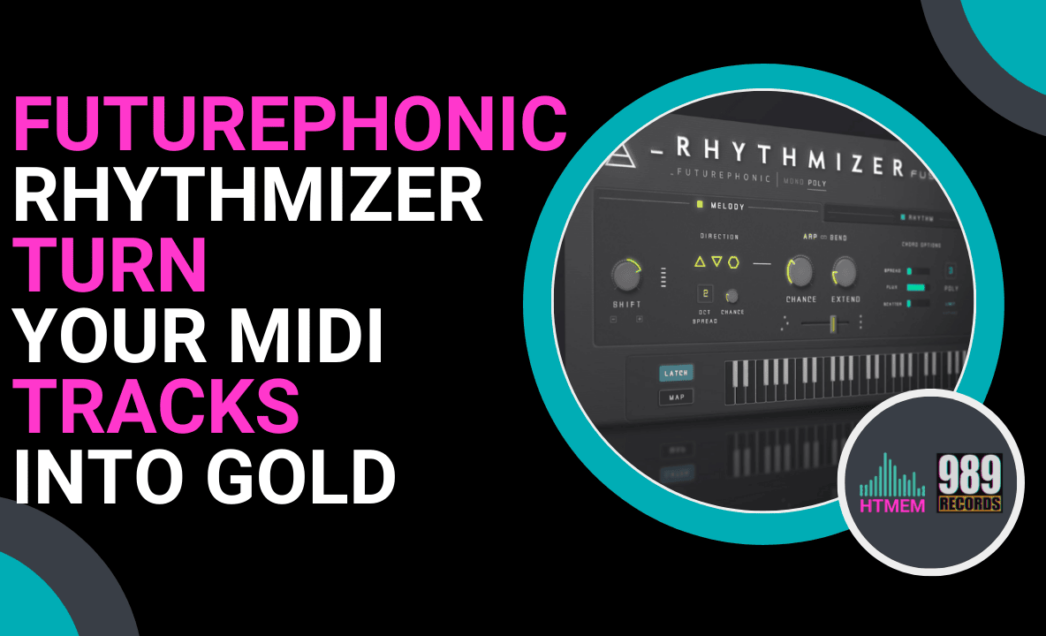



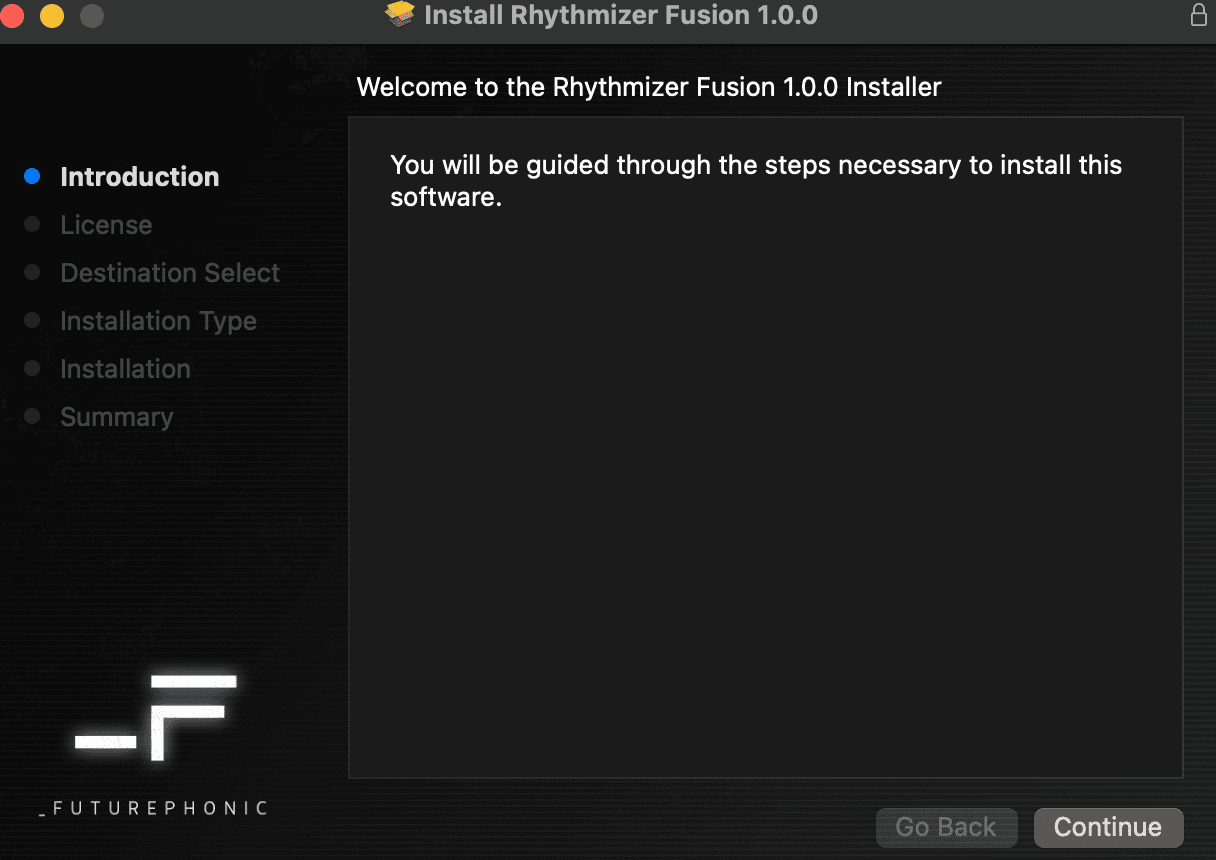
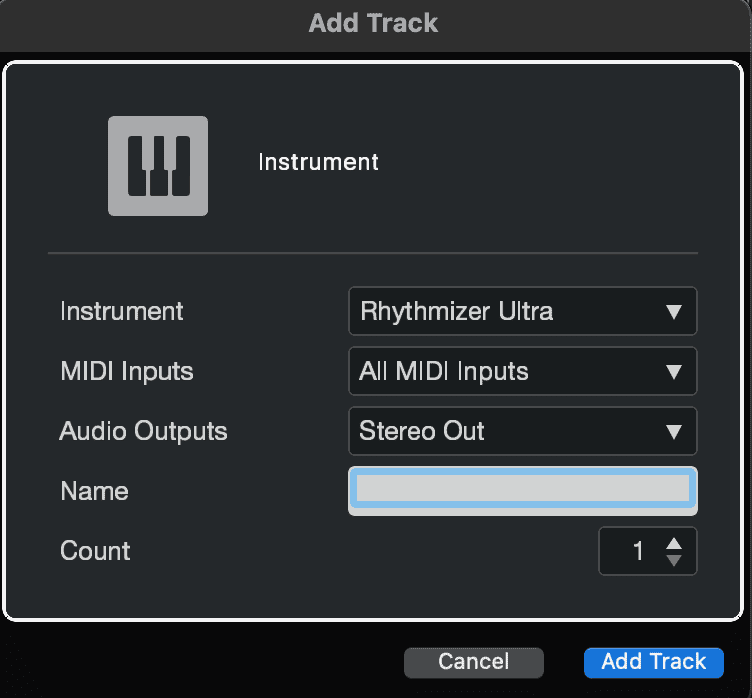
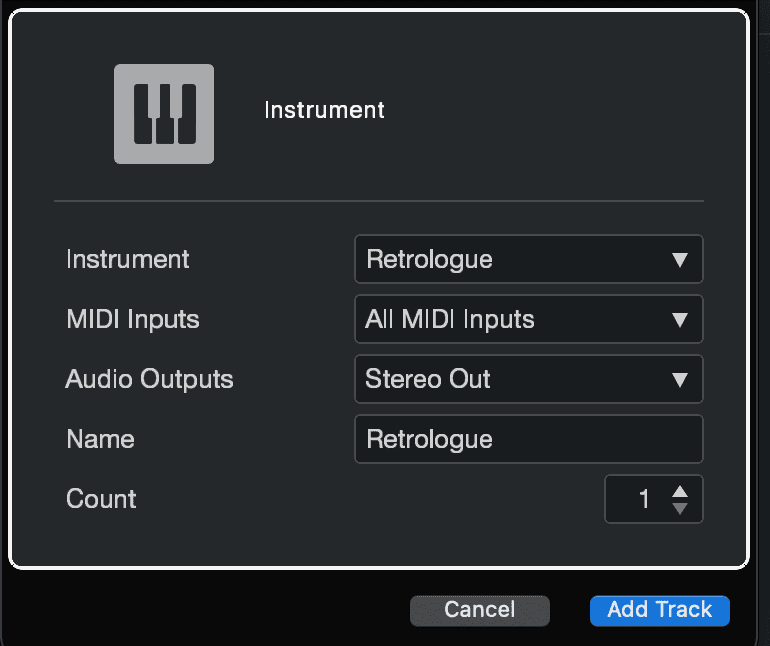
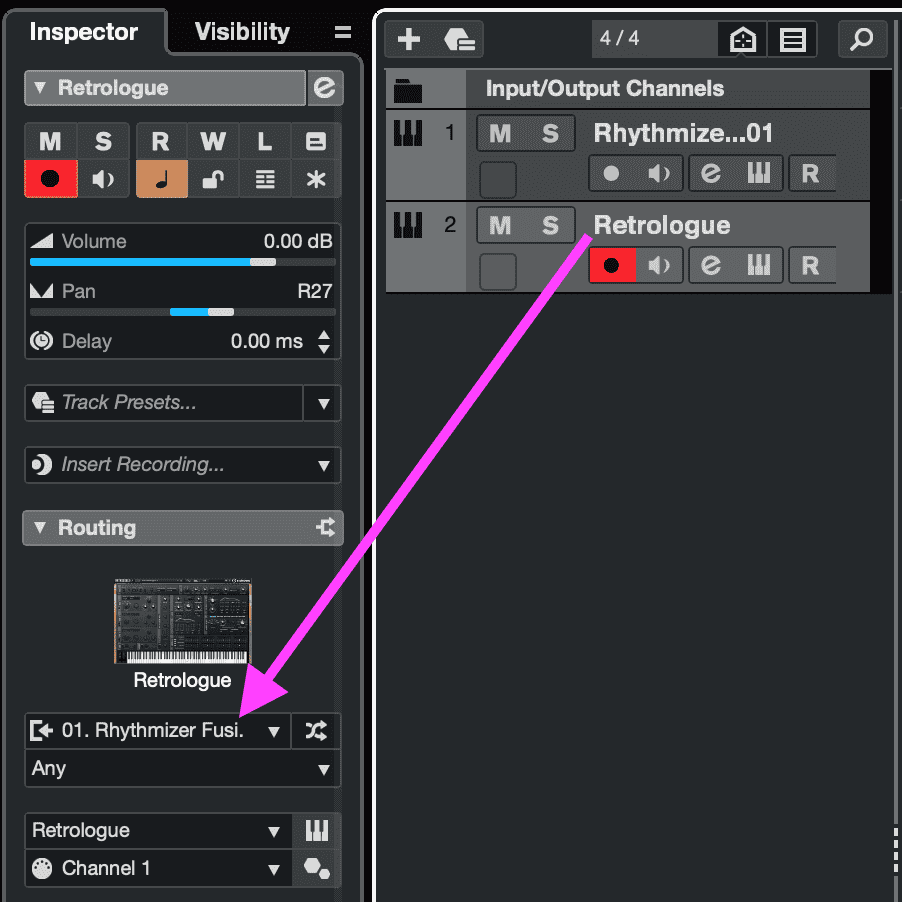
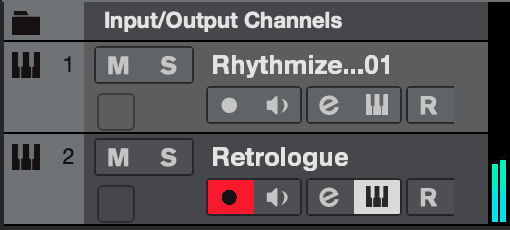 Arm the Instrument Track: To listen to what Rhythmizer will Produce-Remember to record Arm the Track with the VST Instrument
Arm the Instrument Track: To listen to what Rhythmizer will Produce-Remember to record Arm the Track with the VST Instrument